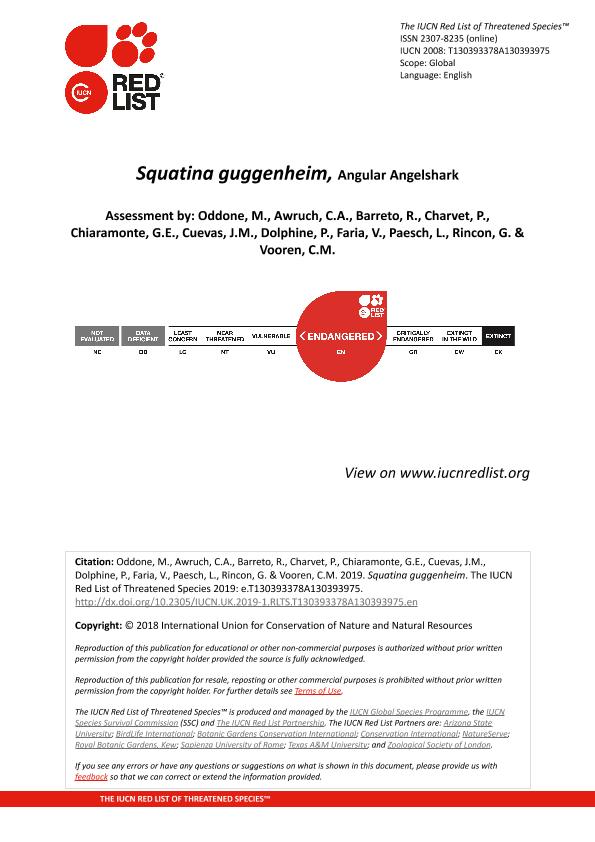Artículo
Squatina guggenheim, Angular Angelshark
Oddone, M.C.; Awruch, C. A.; Barreto, R.; Charvet, P.; Chiaramonte, Gustavo Enrique ; Cuevas, J.M.; Faria, V.; Paesch, L.; Rincon, G.; Vooren, C.M.
; Cuevas, J.M.; Faria, V.; Paesch, L.; Rincon, G.; Vooren, C.M.
 ; Cuevas, J.M.; Faria, V.; Paesch, L.; Rincon, G.; Vooren, C.M.
; Cuevas, J.M.; Faria, V.; Paesch, L.; Rincon, G.; Vooren, C.M.
Fecha de publicación:
07/2019
Editorial:
International Union for Conservation of Nature
Revista:
The IUCN Red List of Threatened Species
e-ISSN:
2307-8235
Idioma:
Inglés
Tipo de recurso:
Artículo publicado
Clasificación temática:
Resumen
The Angular Angelshark (Squatina guggenheim) is a small demersal shark that reaches a maximum total length of 95 cm total length and inhabits soft sediments from 10 to 80 m depth on the continental shelf in the Southwest Atlantic from Rio de Janeiro, Brazil, to northern Patagonia, Argentina. Threats to this species include being caught as bycatch in trawl and bottom-set gillnets. The species' low reproductive potential (litter size of 3-9 and triennial female breeding cycle) together with its vulnerability to both trawl and gillnet gear makes it highly susceptible to population depletion. Angel sharks are notoriously difficult to identify, and catches are typically reported at the generic level and therefore include at least three species that are native to the region (the Angular Angelshark, the Argentine Angelshark (S. argentina), and the Hidden Angelshark (S. occulta)). Angel sharks are heavily fished in southern Brazil and significant declines have been documented there as well as in Uruguay and Argentina. Although data in some parts of the species? range (e.g. southern Brazil) infer population reductions of angel sharks of >90% over the last three generations (24 years), reductions have not been as severe in the Argentinean-Uruguayan Common Fishing Zone (AUCFZ), reaching 55% over the last three generations. Reductions further south in Argentina are again more than 90%. On balance of these reductions, an overall population reduction of at least 70% is inferred over three generations. The Angular Angelshark is therefore assessed as Endangered A2bd. Fishing continues throughout the species' range. Management and enforcement are urgently needed, particularly in areas outside of the Argentina-Uruguay Common Fishing Zone, in order to to conserve this species.
Palabras clave:
Chondrichthyes
,
Squatiniformes
,
Squatinidae
,
Angular Angelshark
Archivos asociados
Licencia
Identificadores
Colecciones
Articulos(MACNBR)
Articulos de MUSEO ARG.DE CS.NAT "BERNARDINO RIVADAVIA"
Articulos de MUSEO ARG.DE CS.NAT "BERNARDINO RIVADAVIA"
Citación
Oddone, M.C.; Awruch, C. A.; Barreto, R.; Charvet, P.; Chiaramonte, Gustavo Enrique; et al.; Squatina guggenheim, Angular Angelshark; International Union for Conservation of Nature; The IUCN Red List of Threatened Species; 7-2019; 1-15
Compartir



